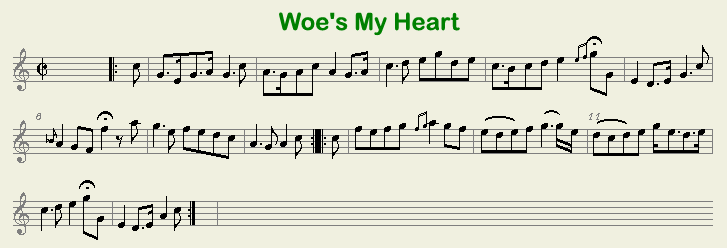|
THRU THE WOODS LADDIE
Franz Josef Haydn, Arrangements, H 31a/181, Thro' the wood, Laddie, 1800.
"O Sandy why leav'st thou thy Nelly to mourn," Andante (fa majeur) avec violon, violoncelle et clavecin.
Thro' the wood laddie. A new Scotch song. [London]. [1780?] 1 sheet: ill.; 1/40. British Library 1875.d.16(45) New York Public Library RBR *KVB
(Ballads) Anonymous. By Allan Ramsay. A slip-song - "O Sawney, why leav'st thou thy Nelly to mourn,". Not in Martin. REFERENCE:
ESTCT50318.
Appears in John Turner's Commonplace Book, 1788;
Calliope, or the Musical Miscellany, 1788;
Scots Musical Museum. Vol 2 of 6, 1788;
The Edinburgh Musical Miscellany, 1792;
Eleazer Cary's Book, 1797.
As Phillis and Thisbie did walk hand in hand/ ZN307| Thro' the Wood, Laddie/ Tune: New Scots Tune/ RB8 722: [no imprint, c 1720?] [Tune,
BBBM #464, and not Scots according to John Glen, Early Scottish Melodies, p. 110. See Simpson for other songs]
Answer to Thro' the wood, laddie. Salisbury: Fowler, printer. [1785?]. 1 sheet; 1/80. British Library 11621.i.11(18*). A song. "O Nelly! no
longer thy Sardy now mourns". REFERENCE: ESTCT22102. University of Birmingham, England.
Max Bruch Scottish Fantasy for Violin and Orchestra Op. 46
1st Movement Introduction - Grave
Adagio Cantabile (on 'Thro' the Wood Laddie'/`Auld Rob Morris')
London Symphony Orchestra, Viktor Fedotov, conductor, Pamela Nicholson, piano, Angel Records, Released 11/12/96.
The Scottish Fantasy was composed in Berlin, Germany
in 1879-80 by Max Bruch born 1838/died 1920.
The complete name for The Scottish Fantasy is:
(Fantasy for Violin and Orchestra and Harp freely using Scottish Folk Melodies, in E-flat Major,Op.46).
Bruch's melodic source for the Scottish Fantasy was The Scots Musical Museum -
an anthology of 600 scots songs collected by James Johnson.
He also wrote the well known -Violin Concerto No. 1 in G Minor, Op. 26 for violin.
In the Adagio cantablile the violinist plays the tune:
Thro the Wood Laddie.
O Sandy, why leaves thou thy Nelly to mourn?
Thy presence cou'd safe me, When naething can please me,
Now dowie I sigh on the banks of the burn,
Or thro the wood, laddie until thou return.
|


![]() Copyright © 2003, InterMedia Enterprises
Copyright © 2003, InterMedia Enterprises